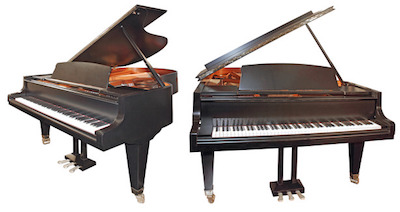Pianos are the largest, most unique instrument you will ever own. If you play a guitar, a trumpet or a flute, at the end of your practice session you place it in its case and close it up until the next time you play. A piano also serves as a piece of furniture, proudly on display in your home day in and day out. 
The piano was one of the most prominent pieces of furniture on display in a person’s house for decades. The term “piano finish” has come to equal one of the highest qualities of wood finish available for fine furniture. After all, it may be the oldest piece of furniture in your room, and if well taken care of, can keep going for generations.
Pianos today are finished using multiple types of materials. You’ll find polyurethanes, traditional lacquers, and polyester resins. While the main purpose of the piano finish is to protect the instrument itself, it also is intended to minimize any impact from the surrounding environment, including damage from heat and humidity.
Most important, modern finishes are created to do their job with no additional help from waxes or polishes, and are best maintained with simple cleaning methods.
Because a piano is constructed from wood, the cabinet expands and contracts with changes in levels of humidity. If the changes are severe enough, the finish will eventually begin to develop cracks and deteriorate over time. So moderating the environment and controlling where your piano is located is a vital part of caring for the finish. A piano should never be kept in an area where it is subjected to swings in moisture or temperature. Keep it away from vents, windows, open doorways, and heat sources, always avoiding direct sunlight.
Dust is one of the most abrasive items that can damage the finish. To avoid scratching, remove dust with a soft fabric towel, like cotton, and avoid synthetic materials as they are usually quite coarse.
Avoid polishes and waxes at all costs. Furniture polish can ruin a piano’s finish, as they contain silicone and other oils that soften the finish and make it more vulnerable. It can contaminate the wood and spread inside the piano, wreaking havoc on the interior parts. If you choose to use a cleaner, stop by your local piano dealer and pick up a cleaner made exclusively for piano finishes.
With just these few precautions, you’ll keep your piano looking as good as new, for however long you choose to own it and keep it on display.

